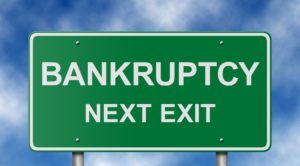Last month, hip-hop star and savvy businessman Curtis “50 Cent” Jackson filed for bankruptcy. He reportedly filed for Chapter 11 protection in bankruptcy court to protect his assets after he lost a civil trial with Lastonia Leviston, rapper Rick Ross’ ex-girlfriend.
People quickly took to social media with their opinions on the matter:
“50 Cent just became Zero Cent.”
“That awkward moment when 50 Cent can’t even spare a dime…”
“I’m shocked, as usual you get quick money, buy a bunch of material unnecessary things that have no value… yeah I am so shocked he’s broke.”
The term “bankruptcy” usually has a negative connotation and is all too often misunderstood.
According to CNNMoney’s Cristina Alesci, bankruptcy simply means “you borrowed some money and you can’t pay it back.” In a brief video on MSN.com, Alesci explains the three main kinds of bankruptcies:
• Chapter 7 – “You are forced to sell your assets until your debt is paid off and if there is nothing left to sell, the debts are forgiven.”
• Chapter 11 and Chapter 13 – “When you can’t pay the lender back in cash, these types of bankruptcies are shields against the lender taking your stuff. It allows you some breathing room to figure out how to pay the debt back as well as come up with a payment plan. The debt you actually pay back depends on what you earn not what you owe.”
While many people assume that 50 Cent is now broke, or on his way there, others understand that this is merely a wise business decision. For business, bankruptcy is not necessarily a bad thing.
Popular Italian fast-food chain Sbarro filed for Chapter 11 bankruptcy a few years ago. Former CEO James Greco told QSR Magazine that restricting saved the brand.
“We’re going to remake this into a new, thriving company in the marketplace, and it couldn’t have happened without the bankruptcy filing,” he said.
If your business is in a bind and bankruptcy is not an option, there are other alternatives. Nerdwallet.com explains two of them:
• Debt settlement: You or a credit counselor contacts each of your lenders to try to negotiate a way out. You’ll pay a lump sum that’s less than the amount you owe, and the creditor will consider the debt repaid.
• Debt consolidation: You take out a new loan (presumably at a lower interest rate) and use the money from the loan to pay off all your other debts. You then make your monthly debt payments toward the new loan. For example, you can take out a home equity line of credit to pay off your credit cards.
However, if you are considering filing for bankruptcy, contact a lawyer to explore your options.



